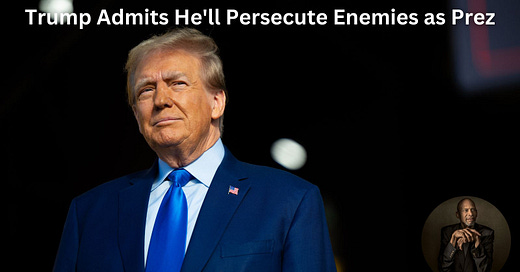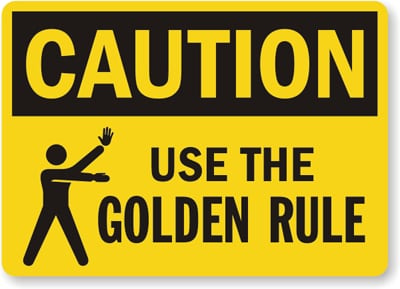Trump Admits He'll Persecute Enemies as Prez & Ohio GOP Cancels Voters' Abortion Decision
Plus: FL Republican Apologizes for Suggesting Palestinian Genocide, Boebert Claims the GOP's Survival Rests With Her, "Bass Reeves" Is Cool, and Richard Baskin Sings
What I’m Discussing Today:
Kareem’s Daily Quote: There are thousands of variations of the biblical “do unto others” teaching. Here’s why I like the biblical version the best.
Florida Republican Calls for Genocide of Palestinians: Michelle Salzman wants to kill ‘em all. Leadership at its finest.
Lauren Boebert Thinks She’s the Cornerstone of the GOP: Her tweet soliciting campaign donations reflects her as a politician: self-important and hollow of reason.
Trump Admits He’d Use His Office to Persecute Political Rivals: Another smoking gun in his hand to prove he wants to assassinate democracy.
Ohio GOP Doesn’t Like the Abortion Vote, So They’re Cancelling It: You know you’re an American patriot when you override democracy to enforce your own religious views.
What I’m Watching on TV: Lawmen: Bass Reeves tells the compelling story of a real-life deputy U.S. Marshall—who just happens to be Black.
Kareem’s Video Break: I dare you not to smile at this sneaky dog.
Richard Baskin Sings: Back in 1976, a quirky movie called Welcome to L.A. was released with jazzy-bluesy-soulful songs that still haunt.
Kareem’s Daily Quote
Do unto others as you would have them do unto you.
Jesus, Luke 6:31 and Matthew 7:12
This quote is often referred to as The Golden Rule because almost all religions and philosophies can be distilled into this one universal idea. To follow this is to have achieved full potential as a human being. There are hundreds of similar sayings from every religion and most philosophers throughout history, many from hundreds of years before Jesus or the Bible. (For a comprehensive list, check out The Golden Rule Project.) For example:
“Do not unto others what you would not have them do unto you.” Confucius (c. 551 – c. 479 BCE), Analects 15:23 (Confucianism)
“Hurt not others in ways that you yourself would find hurtful.” Tripitaka Udanavarga 5:18 (Buddhism)
“Do not do to others that which would anger you if others did it to you.” Socrates
“Not one of you truly believes until you wish for others that which you wish for yourself.” The Prophet Muhammad Hadith (Islam)
The reason I chose to highlight the biblical version over the other variations is that most of the others approach the concept as a warning about what not to do. But the biblical quote frames it so that we should diligently “do unto others,” meaning not just avoid harming, but intentionally going out and doing good. The Islamic admonishment— “Not one of you truly believes until you wish for others that which you wish for yourself.”—has that same vibe. One should wish for others what we would want. But that still stops short of actively doing. That little difference is what makes the biblical teaching the most challenging to follow.
So simple—yet, so hard. Sudoku for the soul. The main challenge to living by this teaching is that we can MacGyver it whenever the going gets tough. We find a sneaky workaround that allows us to ignore the rule, but still feel virtuous: “That person hurt me, therefore they don’t deserve my doing unto them.” “That person doesn’t follow the teaching so why should I follow it with them?” And so forth. We’re ingenious when it comes to tricking ourselves.
The thing is, the teaching doesn’t say “do unto some others” or “do unto deserving others.” Just others. That’s the point. By following the teaching, two practical things happen: First, you are overcoming your own biases and emotional roadblocks to become a better person. This will lift a lot of burdens from you and make you happier. Second, through your selfless example, you are helping to create a world in which everyone follows this teaching. You’re creating “others'“ who will also do unto you.
Sadly, this is the most popular and least followed teaching. Part of the reason is that many people can’t distinguish between doing unto others and imposing on others. Doing unto others is to treat others as they wish to be treated. However, some prefer to impose their beliefs and value systems on others instead. Which would be the opposite of the teaching. The goal of these people is not to do good, but to feel good about themselves.
I think of this quote whenever my pettiness, ego, stubbornness, or biases nudge me to be rude, dismissive, or even cruel. To deliberately inflict emotional pain on another is shameful. It is a transgression we have all committed, but to pull out a Richard Wilbur quote I recently wrote about, “The past is never past redeeming.”
We can do better unto ourselves. We must do better unto others.
This Week in Dumb & Dangerous Statements by Politicians
In John Carpenter’s 1982 movie The Thing, a group of researchers in Antarctica are being killed by an alien entity that can shape-shift into the person it kills in order to get closer to the others. Unable to determine from appearance which of them is the alien, the men devise a test in which they stab a sample of each person’s blood with a heated wire, knowing the creature’s blood will react differently.
That’s what my “This Week in Dumb & Dangerous Statements” section is: A sizzling wire applied to the lifeblood of democracy to identify those who resemble Americans who love democracy, but who are actually evil beings bent on destroying it.
What makes this feature so necessary is the openness with which so many politicians and celebrities express their anti-American sentiments with no fear of reprisals. After all, the GOP frontrunner choice to be their president is a rapist (“Judge clarifies: Yes, Trump was found to have raped E. Jean Carroll”), a fraud (“Judge rules Donald Trump defrauded banks and insurers while building real estate empire”), and a murderer who deliberately allowed people to unnecessarily die by hiding how serious COVID-19 was (“Trump Tells Woodward He Deliberately Downplayed Coronavirus Threat”). What mental contortions these people must go through to justify their support of this heinous person?
If we don’t call out people in power each and every time they say or do something that sabotages the ideals of our country, then we’re normalizing that behavior, which essentially excuses it. I can’t do that. So here comes the red-hot wire.
Outrage grows after ‘chilling call for genocide’ by Florida Republican (The Guardian)
SUMMARY: Outrage continues to grow over a public comment made by a Florida state Republican lawmaker calling for all Palestinians to die.
The remarks came during a debate in the state legislature about calling for a ceasefire in Israel’s invasion of Gaza, which has so far killed more than 10,000 Palestinians, many of whom are children. The assault came after Hamas fighters attacked Israel from Gaza, killing at least 1,400 people and taking more than 200 hostage.
In the speech in support of the ceasefire resolution, the Democratic Florida state representative Angie Nixon said: “We are at 10,000 dead Palestinians. How many will be enough?”
“All of them,” Michelle Salzman called in reply.
MY TAKE: The increased violence in the U.S. against both Jews and Palestinians is a testament to some people’s inability to distinguish between the acts of politicians and the population. For example, an independent commission set up by the Bishops' Conference of France released a report estimating that 330,000 French children (80% boys) were molested by Catholic church priests and employees between 1950 and 2020. Should Catholics around the world—some of whom may be actual victims—be randomly stabbed, beaten, and harassed because of what the priests did? Neither should Muslims, Jews, or Palestinians be punished for the acts of a few political “leaders.”
Salzman said something incredibly vicious and shockingly stupid. If others around the world heard her statement, would they be justified in attacking Americans on the streets for supporting genocide?
Of course, she later apologized: “It's the most horrific of implications,” Salzman wrote on Thursday. “I am so incredibly sorry for even the slightest of suggestions that I would want an entire community erased. My comments were unapologetically towards the Hamas regime – I NEVER said Palestine.”
Well, she did say it. She may or may not have meant it. But as we often see with celebrities and politicians who say horrific things—and later offer tepid apologies—the damage is already done. Many more people will hear her original statement than her apology. She has given support to those who would violently attack Palestinians here in the U.S.
Salzman should not go unscathed for what she said. In a just world where people hold their elected officials to a high standard of intelligence and integrity, she would be charged for hate speech, possibly removed from office, and certainly not elected again for any office. We’ll see what kind of just world Florida is.






